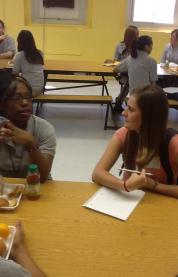








|
Hailey takes notes as she interviews a student at Chicago’s EPIC Academy. |
|
LSFY 103-05: Urban (School) Legends? |
|
I have now taught this course twice, during the spring terms of 2012 and 2013. The course blends the requirements of the LSFY 103 program (the production of an argumentative research paper, an oral presentation, process writing, etc.) with an intensive experiential/service-learning requirement (a weekly 2-hour service commitment with refugee children in west Rock Island, pen-palling with south Chicago teenagers, a field trip to a Chicago high school, and hosting the Chicago teens here on campus). The classroom-based and experiential learning experiences complement each other well. Common readings and discussions focus on urban school issues in the United States. These readings provide context for students’ engagement with real life urban school settings, and the real-life experiences in turn help students develop a deeper appreciation for the ideas they encounter in their academic work. Students are required to blend academic research and real-world engagement in their culminating research papers as well. As noted in the syllabus, students are prompted to identify a specific research topic or question that will require them to conduct independent library research as well as gather specific information from appropriate contacts in the schools and the community. The ulterior objective of the course is that students will develop inter-cultural competence and become more conscious of various inequities in society. As an LSFY course, though, the overt objective is to help students develop as writers. I provide extensive support to each student as they practice the craft of writing over the course of the term. Students are required to produce at least two pieces of writing per week (a journal entry and a pen pal letter are produced weekly). They also develop their culminating research papers gradually over the term. They begin with an “Integrative Reflection” paper where they are prompted to draw connections across multiple sources of knowledge (readings, discussions, films, service work, pen pal exchanges) and hopefully begin to articulate a specific area of interest. This is followed by a Research Proposal where they articulate a research topic/question and share their library-based and community-based strategies for gathering knowledge about their topic. The research paper itself is built via three submitted drafts. Students receive explicit guidance and feedback from me as they march through the process. Every student receives weekly written feedback from me when I respond to their journals. Students receive even more elaborate support from me as they build their research papers. In addition to written feedback on their drafts, I also share audio-visual feedback on their writing via movie files. The students have expressed appreciation for this technological approach to feedback, indicating that the audio-visual feedback enhances the written feedback that they receive. The links below provide access to the full range of feedback that a single student received from me over the course of the term. It should be noted that each student in the class received a similar amount of support. |


|
Mike Egan Assistant Professor Education Department |
|
Course Artifacts
Augie Video Feature on EPIC Academy Visit to Campus
Syllabi
Student Ratings of Instruction Spring 2012 Quantitative Summary
Spring 2013 Quantitative Summary
|
|
A-V Feedback Integrative Reflection
Prelim Lit Review (aka 1st Draft)
Refined Lit Review/Prelim Qual. Analysis (aka 2nd Draft)
Note: these are large video files that may take some time to download. Each video has an“.mp4” format and hence should be playable on PCs, Macs, and mobile devices. Students received accompanying PDF files (written feedback) in addition to the video feedback shown here.
Trouble-shooting tip for PC users: if your browser does not automatically play the video file, right-click on the link, choose “Save target as…” (or “Save link as…”), then download to your computer’s desktop and play the file from there. |
|
Written Feedback Week 1 Journal Week 2 Journal Week 3 Journal Week 4 Journal Week 5 Journal Week 7 Journal Week 8 Journal Research Proposal Final Paper Final Presentation
Note: This student chose not to submit his journal assignment during weeks 6 & 9; I did not require the journal week 10. The Final Paper and Final Presentation were summative assignments and hence less formative feedback was provided. |